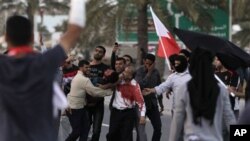President Barack Obama is urging Middle Eastern leaders to show restraint in dealing with anti-government protesters. The president is condemning the violence reported against demonstrators in Bahrain, Libya and Yemen.
The president issued a written statement opposing the violence Friday, which was read to reporters by press secretary Jay Carney aboard the presidential airplane Air Force One.
"I am deeply concerned by reports of violence in Bahrain, Libya and Yemen," Carney read from the president's statement. "The United States condemns the use of violence by governments against peaceful protesters in those countries and wherever else it may occur."
Carney said the president’s statement also expressed condolences to the families and friends of those killed in the unrest, and urged restraint.
"Wherever they are, people have certain universal rights, including the right to peaceful assembly," he said. "The United States urges the governments of Bahrain, Libya and Yemen to show restraint in responding to peaceful protests and to respect the rights of their people."
As the president traveled from San Francisco, California to Portland, Oregon, Carney told reporters that Obama is receiving regular briefings on the situation in various Middle Eastern countries.
"Obviously, he has a national security aide with him," he said. "He also has, for several weeks now as these events in the Middle East have been unfolding, he tasked his national security staff to provide even more regular updates on the situation."
Soldiers in Bahrain opened fire Friday on anti-government demonstrators. In Libya, protesters clashed with security forces after a funeral for 15 people killed in the violence. And in Yemen, tear gas and live ammunition were used on demonstrators as they clashed with riot police and government supporters.
At the U.S. State Department, spokesman P.J. Crowley said Friday violence is not the right answer, and governments should be responsive to their people.
"There is a new dynamic in the region. These protesters are not going to go away," Crowley said. "They are no longer intimidated by governments. It is now up to these governments to face this new reality, make commitments to reform and then follow through on those commitments."
Bahrain and Yemen are important U.S. allies in the Middle East.
Leaders there and elsewhere in the region are facing anti-government demonstrations after popular uprisings drove out the leaders of Tunisia and Egypt.
Obama Urges Restraint in Middle East
- By Kent Klein




